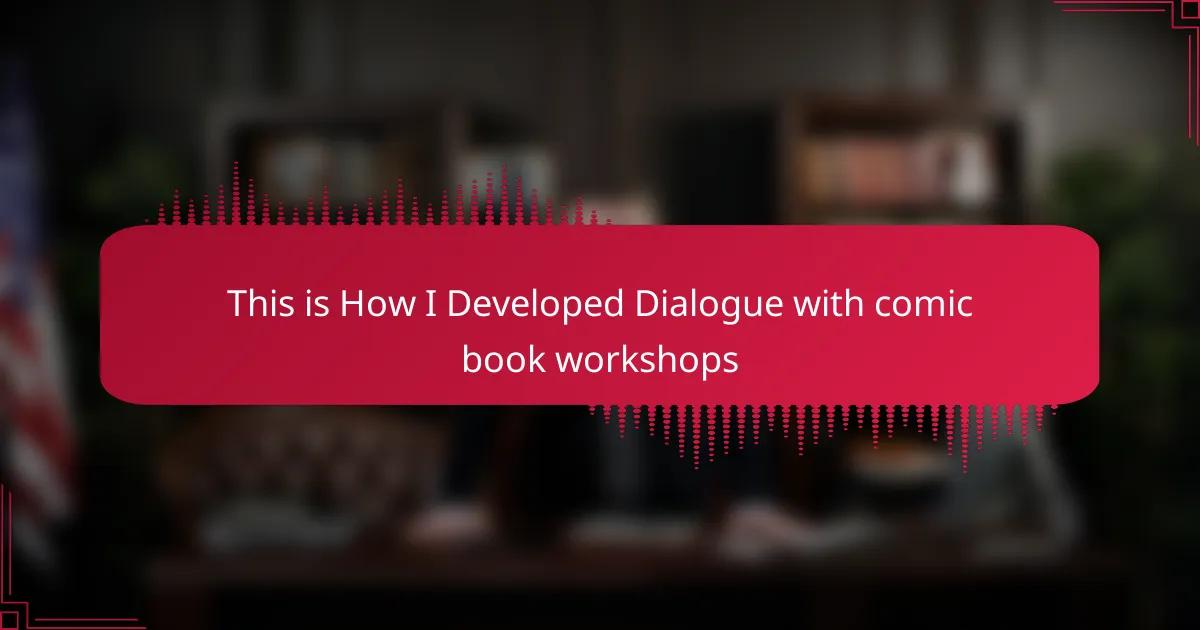Key takeaways
- Comic book workshops foster creativity, providing a supportive space for artists and writers to explore dialogue and storytelling techniques.
- Building a community through workshops encourages collaboration, constructive feedback, and lasting friendships among creators.
- Effective dialogue creation focuses on character voice, real-life speech patterns, and the use of subtext to enhance authenticity.
- Engaging workshop participants through personal stories and interactive activities enhances the overall experience and creativity in the room.
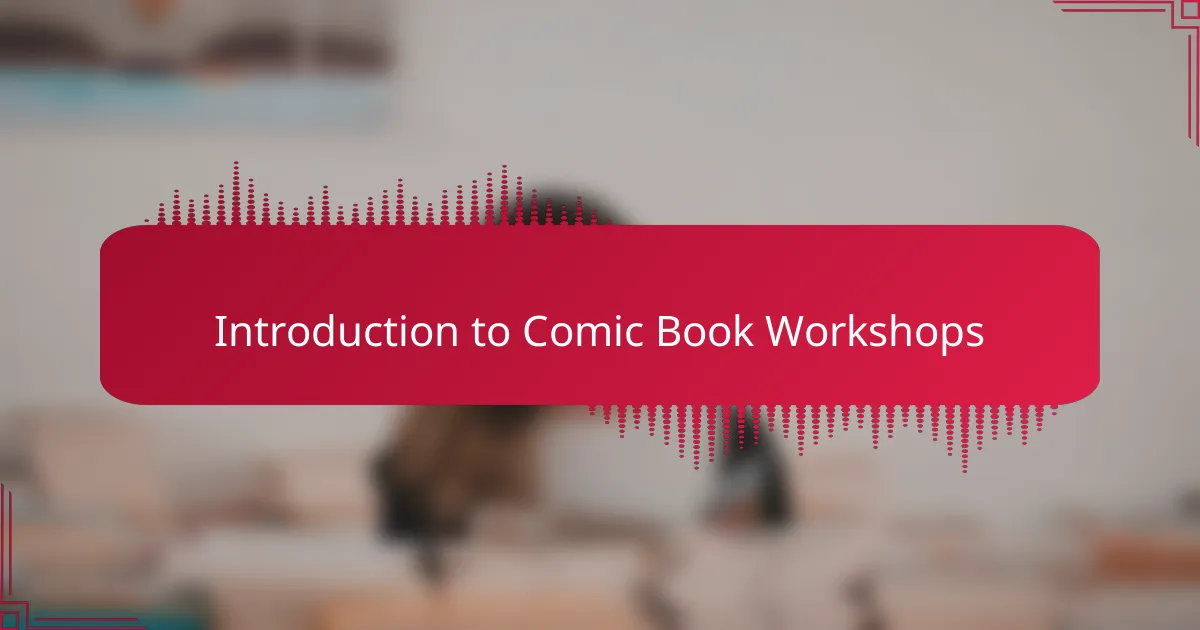
Introduction to Comic Book Workshops
Comic book workshops are a transformative space for aspiring artists and writers alike. I remember my first workshop, feeling a mix of excitement and nerves as I walked in. The camaraderie and shared passion for storytelling made me realize just how essential these spaces are for developing dialogue skills. Through collaboration and practice, I’ve learned that engaging dialogue can elevate the narrative and resonate deeply with readers.
These workshops often provide a platform for feedback and inspiration, allowing participants to explore new techniques in a supportive environment. In my experience, the energy in these rooms fosters creativity, leading to breakthroughs in storytelling that I hadn’t anticipated.
Here’s a quick comparison table illustrating the different aspects of various comic book workshops:
| Workshop Type | Focus Area |
|---|---|
| Art Workshops | Visual storytelling and illustration techniques |
| Writing Workshops | Dialogue development and narrative structure |
| Collaboration Workshops | Team dynamics and joint story creation |
| Genre-Specific Workshops | Unique styles and conventions within genres |
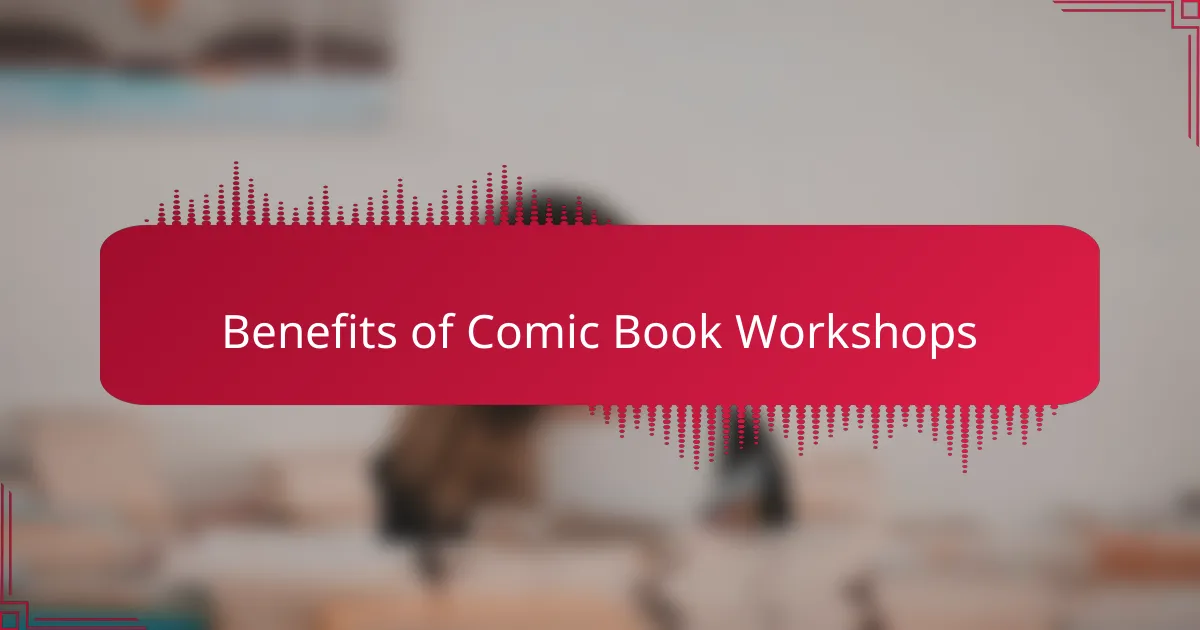
Benefits of Comic Book Workshops
When I think about the benefits of comic book workshops, my mind instantly goes to the creativity they unlock. Participating in these workshops has given me a safe space to explore ideas and voices that I may have hesitated to share otherwise. I remember my first workshop experience; the energy was contagious, and I left feeling inspired and motivated to take my storytelling to the next level.
Additionally, workshops foster a sense of community among creators. I’ve made lasting friendships with fellow artists who share the same passion for storytelling through visuals. The feedback I received there was invaluable, often highlighting aspects I hadn’t considered. It’s truly amazing how collaboration can transform my own work and push me to new creative heights.
Furthermore, the structured environment of a workshop provides an excellent framework for honing dialogue. I found that writing panels with guided prompts helped me tighten my scripts. The challenge of creating engaging dialogue under a time constraint was exhilarating and has profoundly impacted my writing process.
| Benefit | Description |
|---|---|
| Enhanced Creativity | Encourages exploration of new ideas and voices. |
| Community Building | Connect with fellow creators, fostering friendships and collaboration. |
| Focused Feedback | Receive constructive criticism that highlights areas for improvement. |
| Skill Development | Structured prompts promote tighter writing and refined dialogue. |
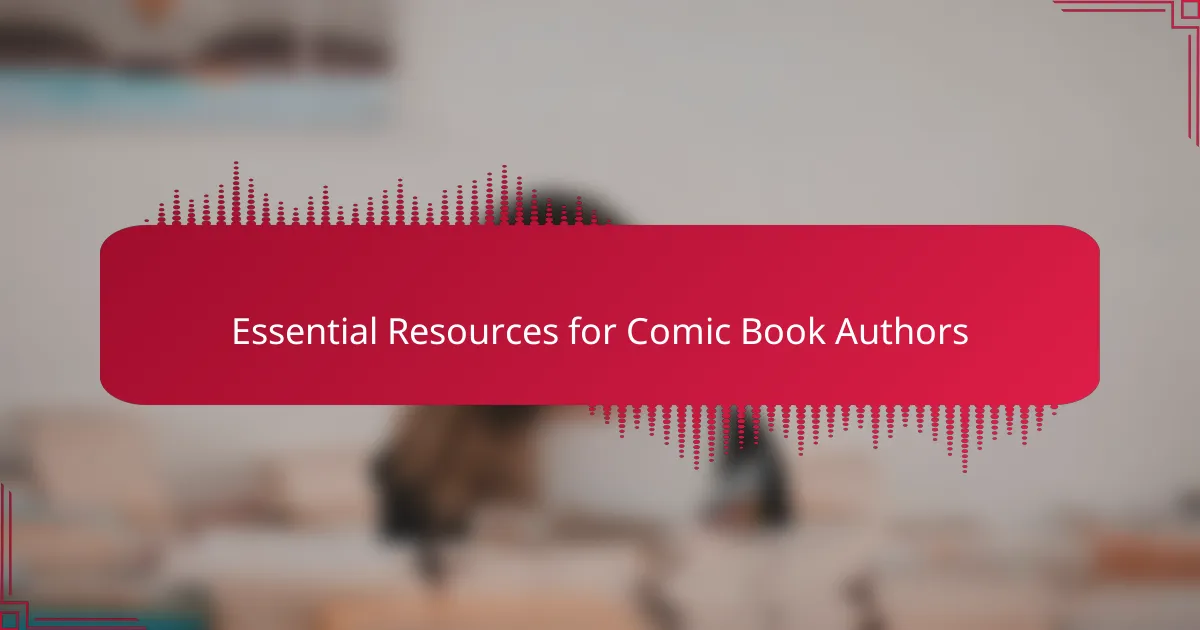
Essential Resources for Comic Book Authors
One of the most indispensable resources for comic book authors is access to reference materials, especially when it comes to understanding dialogue dynamics. I often turn to books that focus on character development and dialogue techniques. For instance, reading “The Art of Dialogue” by Lew Hunter provided me with invaluable insights into crafting authentic conversations. Have you ever felt stuck, struggling to find the right words for a character? I have, and those reference materials served as my lifeline.
Another essential resource I’ve found is online platforms for critique and feedback. Websites like Scribophile and Writer’s Cafe allow authors to share their work and receive constructive criticism from a diverse group of peers. I remember posting my first dialogue-heavy script and feeling a rush of anticipation. The responses were eye-opening, shedding light on areas I had overlooked. Engaging with fellow creators online can help you refine your dialogue, making it more relatable and engaging.
Lastly, attending webinars and online courses can open doors to new techniques and perspectives. I discovered a fantastic course on character voice that completely shifted my approach to writing dialogue. These sessions often present unique challenges, pushing me to experiment beyond my comfort zone. Personally, I’ve found that the more diverse my learning resources are, the richer my writing becomes. What resources have you tapped into on your journey as a comic book author? The possibilities are endless!
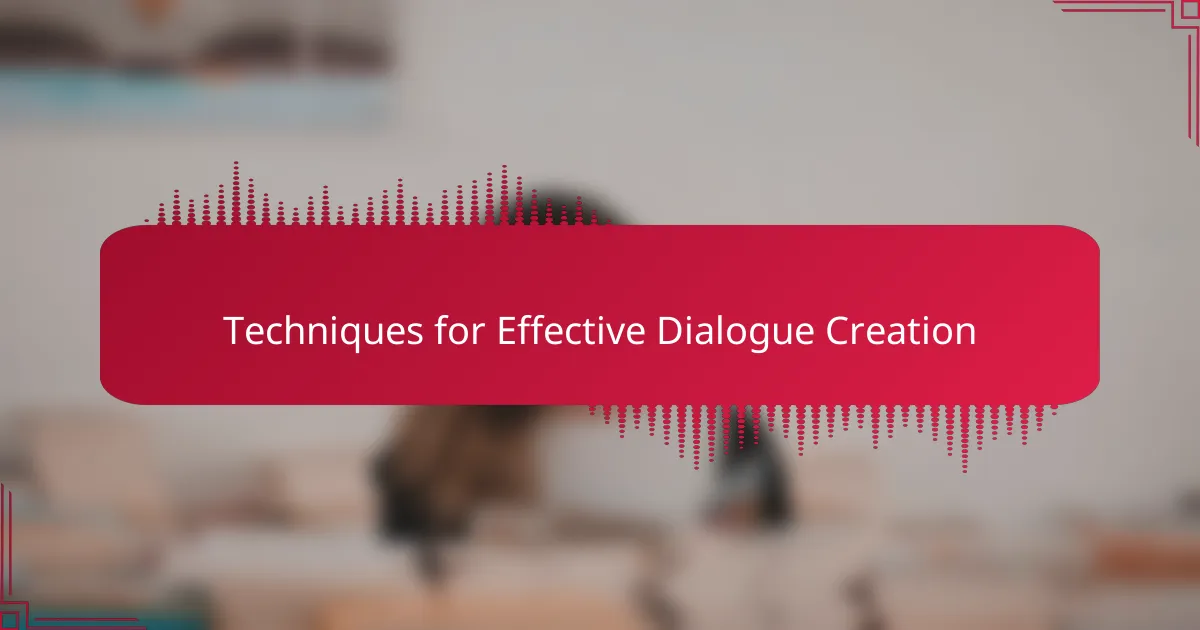
Techniques for Effective Dialogue Creation
Creating effective dialogue in comic books is an art that requires practice and a solid grasp of character voice. From my experiences in workshops, I’ve discovered that it’s essential to listen to how people speak in real life. This observation helps when I craft dialogue that feels authentic and relatable.
One impactful technique is to develop a character’s unique voice by focusing on their background, personality, and emotions. For instance, I once worked with a character who was brash and humorous; I made sure his speech was peppered with wit and sarcasm, which not only made him memorable but also reflected his life experiences.
Another key strategy is to use subtext—what’s unsaid can be just as powerful as the dialogue itself. I recall a workshop where we focused on this technique, drawing from personal experiences to understand how people often communicate more through the emotions behind their words than through the words themselves.
| Technique | Description |
|---|---|
| Listening to Real-Life Dialogue | Capturing authentic speech patterns from everyday interactions. |
| Character Voice Development | Creating distinct speech styles based on characters’ backgrounds and traits. |
| Using Subtext | Highlighting the meaning behind what characters choose not to say. |
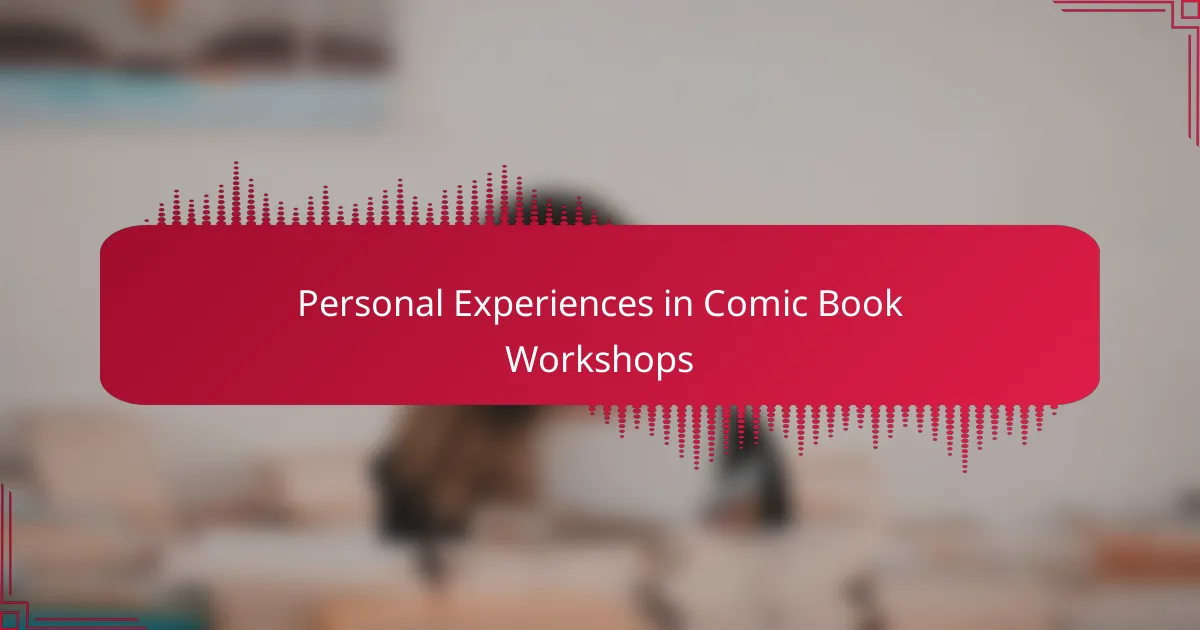
Personal Experiences in Comic Book Workshops
Participating in comic book workshops has been a real eye-opener for me. One particular workshop remains etched in my memory, where we paired off to practice dialogue exchanges. I remember the laughter that erupted when a character I created delivered an unexpected punchline. That moment taught me how spontaneity can bring dialogue to life, making it feel organic and relatable.
Feedback sessions at these workshops can be nerve-wracking yet incredibly rewarding. I vividly recall a time when a fellow participant pointed out how my character’s conversation felt too formal. It made me realize that authenticity in dialogue depends on truly understanding a character’s voice. That simple observation pushed me to dig deeper and embrace the nuances that make conversations more realistic.
What I’ve come to appreciate is that every interaction in these workshops offers a learning opportunity. The stories shared, the struggles voiced, and the creativity unleashed all contribute to our growth as creators. I’ve noticed that the more we share our experiences, the more we refine our dialogue skills, creating a communal rhythm that enhances all of our writing. Have you ever felt that magical connection in a workshop setting? It’s a unique atmosphere that can spark incredible creativity.
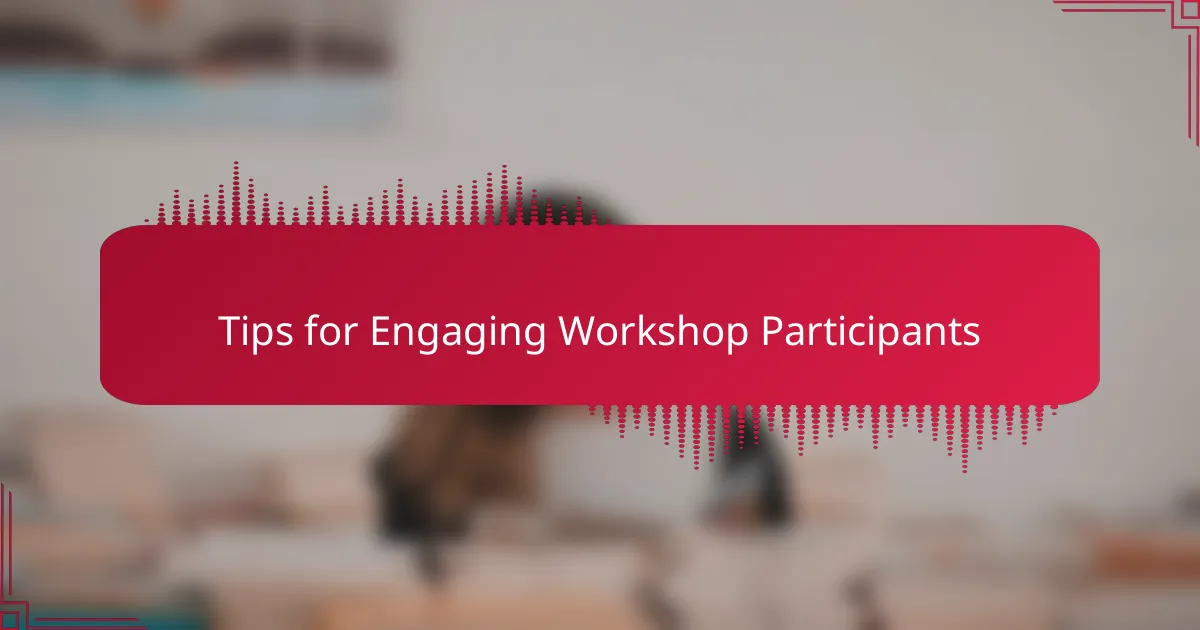
Tips for Engaging Workshop Participants
When it comes to engaging workshop participants, I’ve found that personal stories create a powerful connection. Sharing my own experiences with comic book creation helps others feel more comfortable and prompts them to share as well. I also encourage group discussions; I’ve seen firsthand how collaboration can spark creativity among participants.
Another effective technique is incorporating interactive activities. For example, I often include prompts for participants to create quick dialogues in pairs. This not only gets them thinking critically about character interactions but also builds camaraderie in the room, making the workshop experience more enjoyable.
Lastly, I’ve learned that fostering a welcoming atmosphere is crucial. A warm smile and an open attitude can go a long way. I make it a point to remember names and engage with participants individually, which shows that I value their input and enhances their overall experience.
| Tip | Description |
|---|---|
| Share Personal Stories | Opening up about your own comic book journey can create a relatable atmosphere. |
| Encourage Interactive Activities | Activities like dialogue prompts can boost creativity and collaboration among participants. |
| Foster a Welcoming Atmosphere | A warm, personal approach, such as remembering names, enhances participants’ engagement. |
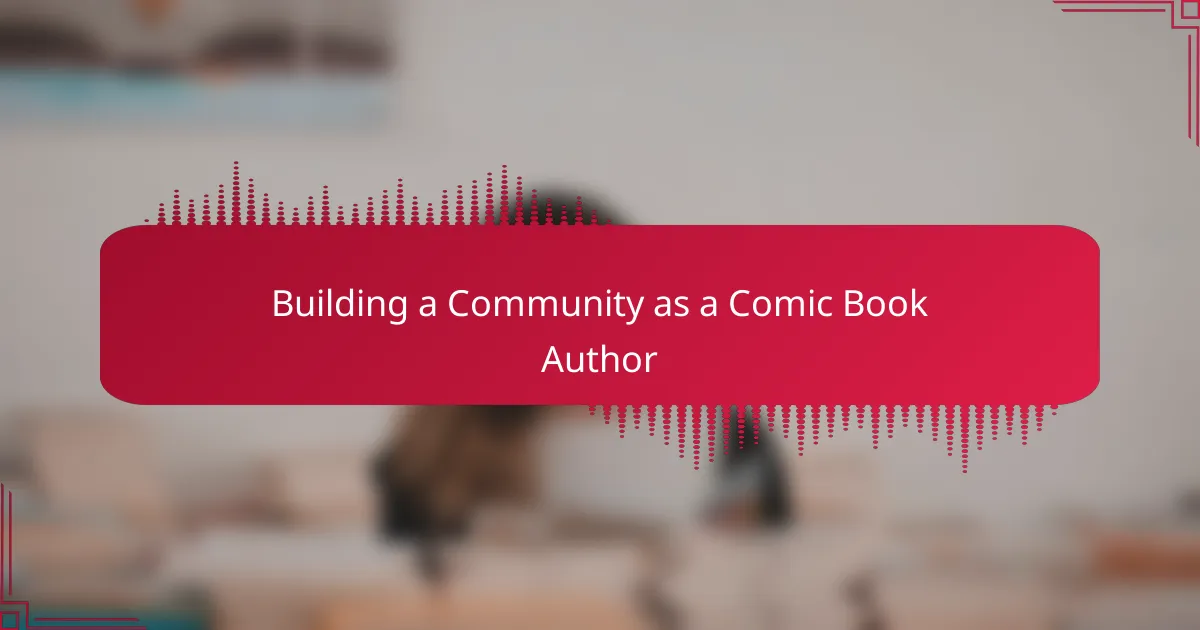
Building a Community as a Comic Book Author
Building a community as a comic book author has been one of the most rewarding experiences of my journey. When I first started, I was unsure how to connect with others in the industry. However, attending workshops and engaging with fellow creators opened up countless doors. I remember the excitement of sharing my work with people who genuinely understood the medium, and it motivated me to refine my craft.
By participating in these workshops, I found not just a support system but also lifelong friendships. Instead of seeing each other as competition, we celebrated each other’s successes and provided constructive feedback. I think that’s what makes a community truly special—it’s about finding your tribe and feeling at home while creating.
Here’s a look at how building community compares to working in isolation as a comic book author:
| Aspect | Community Involvement | Isolation |
|---|---|---|
| Feedback | Frequent and constructive | Limited and often unfiltered |
| Networking | Opportunities for collaboration | Minimal connections |
| Motivation | Increased inspiration from peers | Potential for stagnation |
| Confidence | Boosted by support | Often low without validation |
